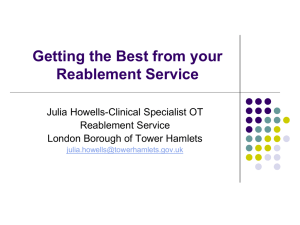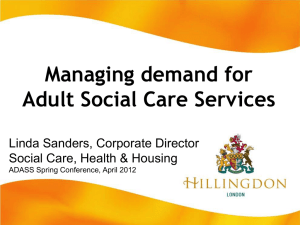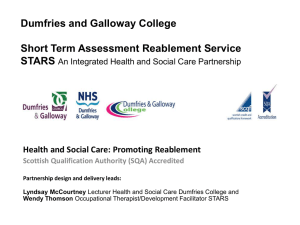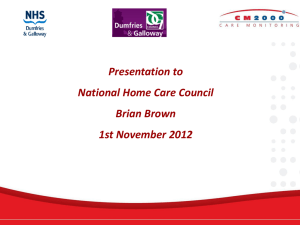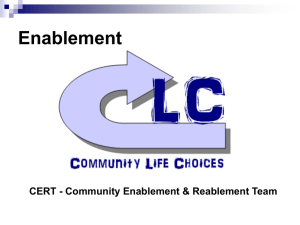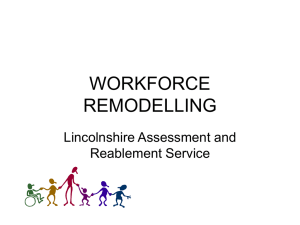In Northern Ireland we have a regional model that outlines how
advertisement
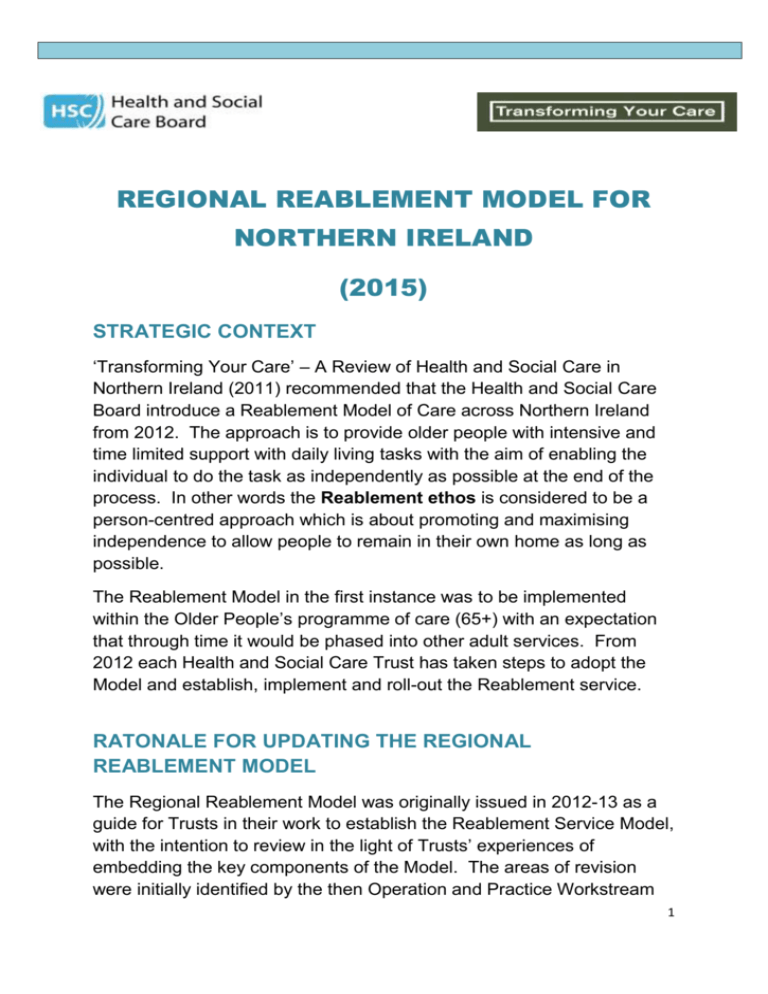
REGIONAL REABLEMENT MODEL FOR NORTHERN IRELAND (2015) STRATEGIC CONTEXT ‘Transforming Your Care’ – A Review of Health and Social Care in Northern Ireland (2011) recommended that the Health and Social Care Board introduce a Reablement Model of Care across Northern Ireland from 2012. The approach is to provide older people with intensive and time limited support with daily living tasks with the aim of enabling the individual to do the task as independently as possible at the end of the process. In other words the Reablement ethos is considered to be a person-centred approach which is about promoting and maximising independence to allow people to remain in their own home as long as possible. The Reablement Model in the first instance was to be implemented within the Older People’s programme of care (65+) with an expectation that through time it would be phased into other adult services. From 2012 each Health and Social Care Trust has taken steps to adopt the Model and establish, implement and roll-out the Reablement service. RATONALE FOR UPDATING THE REGIONAL REABLEMENT MODEL The Regional Reablement Model was originally issued in 2012-13 as a guide for Trusts in their work to establish the Reablement Service Model, with the intention to review in the light of Trusts’ experiences of embedding the key components of the Model. The areas of revision were initially identified by the then Operation and Practice Workstream 1 through a series of themed workshops which were held during 2013-14. These sessions also highlighted a variation in Trusts’ measures on access, targeting and availability, etc. To determine the progress and effectiveness of the Reablement service across the Health and Social Care Trusts, the Reablement Project Board approved a Regional Audit in 2014 which was conducted by the Health and Social Care Board (HSCB) with input from KPMG which brought an independent perspective and an opportunity to help quantify the potential for benefits realisation based on experience elsewhere throughout the United Kingdom. This Review demonstrated that there was a divergence in how the Trusts interpreted the Model and its roll-out. However, it also clearly highlighted the essential components which should be considered for adoption within a Northern Ireland Model. Therefore, to ensure a convergence across the region the HSCB in this Commissioning Statement has revised the Model to reflect key essential elements which will underpin a consistent and effective Model based on this learning. It is the expectation that by developing an agreed revised regional Model a more consistent approach will be achieved in order to measure outcomes, plan investment and set out a “road map” for further improvement. REGIONAL DEFINITION FOR REABLEMENT The following definition of Reablement has been endorsed by the Reablement Project Board for adoption and use regionally. Reablement is a person-centred approach which is about promoting and maximising independence to allow people to remain in their own home as long as possible. It is designed to enable people to gain or regain their confidence, ability, and necessary skills to live independently, especially after having experienced a health or social care crisis, such as illness, deterioration in health or injury. The aim of Reablement is to help people perform their necessary daily living skills such as personal care, walking, and preparing meals, so that they can remain independent within their own home. “Reablement will help you to do things for yourself rather than having to rely on others”. 2 OBJECTIVES OF REABLEMENT To ensure that people are supported to live independently and remain in their own home as long as possible. To promote and maximise independence and help to facilitate early hospital discharge, mitigate the need for hospital admissions and delay the need for ongoing Domiciliary Care. To embed a culture of Reablement within the workforce so that this approach is promoted across staff teams, and subsequently with prospective Service Users and their Families/Carers. To promote a person-centred approach to all aspects of the Reablement episode (ie supporting the Service User to prioritise those functional and social independence tasks which are deemed important to the Service User). To ensure the Reablement service interfaces effectively, for example: with Hospital Discharge, Intermediate Care, Domiciliary Care, Self-Directed Support and Day Care. To promote the person’s access and integration to services in local communities by ensuring that staff have a knowledge base of services available within their localities/communities. To define and maximise the use of community and voluntary based alternatives which through the provision of low-level services could reverse or delay deterioration in a person’s level of independence and social functioning. SCOPE The Reablement service will be inclusive, acting as an “in-take” pathway and should be accessible and available across Northern Ireland for Older People (65+) who are on the threshold of requiring a Domiciliary Care package. The expectation is that through time Reablement will be phased into other adult services/programmes of care. 3 ESSENTIAL COMPONENTS OF THE REABLEMENT SERVICE Establishment of the Reablement Service Ensure there are clearly identified leadership structures to drive forward Reablement and other Community Care Reform initiatives. Ensure staff have a clear understanding of and commitment to the Reablement philosophy and practice and ensure this is communicated to Service Users, their Families/Carers. The Reablement service should be viewed as a distinct service with its own branding and should not be a hybrid of Domiciliary Care. The Reablement service should be an Occupational Therapy-led Model. Ensure 100% geographical coverage in all Trusts’ localities. Prevention and Early Intervention In order to maximise the use of community and voluntary alternatives it will be necessary to scope and map existing services, their role and function in order to identify gaps in support services within communities. Further develop partnership working with community and voluntary based alternatives, independent providers and/or other Government agencies to extend the continuum of available services. Consolidate and enhance partnerships with the community and voluntary sector through Service Level Agreements to support a Reablement Model. Develop and adopt a reigonal Model for Community Navigation. Develop and maintain an electronic/web-based Directory of information on the range of statutory, commuity and voluntary based alternative services available within each of the Health and Social Care Trusts’ localities. Ensure dissemination of the Directory to all relevant Trust staff with a responsibility for navigating to and promoting community and voluntary alternatives to better manage demand on statutory services. Develop a mechanism to monitor diversion and signposting activity to other agencies. 4 Pathway into the Reablement Service Streamline and reduce the access points to core services and ensure that the maximum numbers of Service Users who meet the threshold for a Domiciliary Care package are considered against the criteria for Reablement; and where this is met, benefit from an opportunity of the Reablement service. Ensure application of the Regional Reablement Eligibility Criteria to maximise appropriate targeting. Adopt and use the Northern Ireland Single Assessment Tool (NISAT), as appropriate, for all Service Users. Adopt and use the Regional Maximisinig Independence Plan. Promote the use of Assistive Technology within the Reablement episode (eg Telecare) to support independence and/or to manage risk. Service User progress should be reviewed throughout the Reablement episode and goals and tasks modified to meet the Service Users’ needs. Discharge pathways to be agreed with the Service User: (i) Those not requiring Ongoing Statutory/Domiciliary Care Support but may require signposting to Community/Voluntary based alternatives. (ii) Those requiring Ongoing Domiciliary Care Support (ie New, Reduced,Same, or Increased package, Residential or Nursing Home). Complete Regional Service User Exit Interview and/or Service Satisfaction Tool at the end of each Reablement episode. Brokerage should be utilised as part of the Discharge process to support Service Users who require ongoing care after a Reablement episode to access a package of care in a timely manner and at optimum cost. Service Delivery A Reablement episode is a planned and time-limited service, lasting 6 weeks or less, designed to maximise the Service User’s independence. The operational hours for the service should span from 7.00 am to 11.00 pm, and be delivered 7 days per week. In delivering the Reablement service, cognisance should be taken of the times that the Service User normally peforms their regular activities of daily living. The role of the Reablement Support Workers includes assisting the Service User in daily living activities (eg: personal care needs, mobility, medication, meals management). 5 Where a Service User is in receipt of a pre-existing Domicliary Care package and/or Self-Directed Support (eg Direct Payment) this should be suspended when Reablement is commenced. Howevever, taking cognisance of the need for flexibiity for cases to be considered on a case-by-case basis (80:20 rule) taking into account the principles of safety and risk. The Reablement service should be focused on the achievement of the Service User’s goals for independence; as these goals are met hours of delivery will change. There will be a requirement to have an Out-of-Hours arrangement for the Service User and/or family/carer where there is a need to urgently contact/report a change in the Service User’s circumstance to the Reablement service or where support and/or advice is needed. This arrangement could be integrated into pre-existing Trusts’ Out-of-Hours services. Governance Implement regionally agreed competency framework for Reablement Support Workers and Occupational Therapists working within the Reablement service. Apply a regionally agreed Learning and Development programme for Reablement Support Workers and Occupational Therapists working within the Reablement service. Apply regionally agreed supervision standards for Reablement Support Workers. Performance Management Application of agreed regional minimum data-set for performance management and information. Monitor performance of each locality Team to facilitate benchmarking with a view to enhancing efficiency/effectiveness. Adhere to regional targets as identified by the Health and Social Care Board and outlined in the Commissioning Plan Directions. Benefits Realisation Agree with Trusts Key Performance Indicators (KPIs) which will quanitfy the longetivity and benefits of the Reablement service. 6 COMPONENTS FOR FURTHER DEVELOPMENT Those of 65+ years who meet the eligibility criteria must have access to Reablement services across all Health and Social Care Trusts. Consideration to be given to the expectation of the Regional Reablement Model being phased into other Adult Programmes of Care. HSC On-line should contain relevant Reablement content, to include directory of services to support signposting and diversion and encourage a proactive approach to prevention, by seeking to identify potential Service Users who could be offered preventive care to keep them healthier and reduce their risk of requiring intensive health and social care in the future. A single point of access for all Social Care referrals, which should include screening, diverting people to other agencies, signposting to local community and voluntary based alternatives and providing Reablement as a gateway to core services where appropriate. Outcome measure(s) to be further developed to capture the financial and nonfinancial benfits of the Reablement service and subsequently implemented. Further develop performance management systems to capture additional data on effectiveness and efficiency of the service model. Regional standardisation and application of specialist assessment tools eg cognitive assessments, outcome measure tools. Flexibility of service coverage by Occupational Therapists over a 7 day week. Operate within regional guidelines in relation to the range and maximum number of cases allocated/carried by Occupational Therapy staff. Operate within regional guidelines in relation to the range and maximum number of cases allocated/carried by Reablement Support Workers/Assistants. 7 REGIONAL REABLEMENT ELIGIBILITY CRITERIA The criteria below, must be applied to all those referred to the Reablement service: The Reablement service will be accessible and available across Northern Ireland to all Older People (65+) who are on the threshold of requiring a Domiciliary Care package. Where the assessed needs are identified as Critical and/or Substantial then the “Fair Access to Care Services” criteria must be applied. (see Appendix 1). AND Requiring assistance of a single member of staff. *In exceptional circumstances a Service User may require the assistance of two members of staff as the Reablement episode commences. However, this must only be required in the initial phase of the Reablement episode. The referral to the Reablement service is from either the hospital or community pathways. Has a social care need that affects their daily living activities rather than a therapeutic need. Is medically stable (ie there is no immediate change or deterioration expected in the Service User’s health/condition). Lacks confidence and/or requires support after a health or social care crisis, such as illness, deterioration in health or injury. Has difficulty in performing their essential daily living activities (eg personal care needs, mobility, medication management, meals management). Is motivated to actively engage with the Reablement service. The Services Users have the cognitive ability to relearn daily living activities. 8 EXCLUSIONS FROM THE CRITERIA Service Users who would not be considered eligible for a Reablement service: Service User with complex needs requiring assistance of two members of staff. (unless in exceptional circumstances see above*). Palliative End of Life Care. Advanced/late stages of Dementia. Service User whose condition is liable to immediate deterioration or where the risk factor is such that it would hinder participation in the Reablement service. Service User is not motivated and not prepared to actively engage in the Reablement process. Service User who is at the early stage of a fracture or illness and is not symptom free. Service User who has recently completed a period of Community Rehabilitation and has reached their maximum potential. Note: The Regional Reablement Model for Northern Ireland (2015) will be further enhanced through the development of the Regional Reablement Pathway. 9 10 11 12 13
